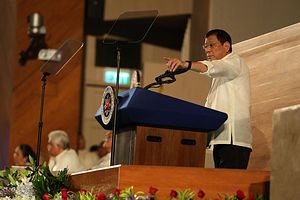The Duterte presidency in the Philippines is little over a year old. But his administration’s short reign provides a cautionary tale of how quickly human rights institutions can become maligned, if not dismantled, if nobody fights back. That fight is decidedly political and must be unashamedly based on human rights.
Undeniably, there has been little to champion in the Philippines during what Human Rights Watch called a calamitous year, but as year two begins Duterte is building on what he and his supporters may claim as one of their few victories. The quest to uphold human rights in the Philippines was already a very difficult struggle when Duterte was elected, but in little over a year into his six-year term the human rights agenda in the Philippines is in a perilous position, thanks to the president and his acolytes’ disparaging pronouncements and their policies.
Concern was supplanted by horror following the president’s 2017 State of the Nation Address (SONA) delivered last Monday and the threat to abolish the Philippines’ National Human Rights Institution (NHRI), the Commission on Human Rights (CHR). Having already demeaned the idea of human rights to such a degree, the obvious danger is that the administration is now emboldened to do away with the CHR entirely.
The CHR is the oldest NHRI in Southeast Asia, created and enshrined in the 1987 constitution following the People Power revolution that ousted the Marcos dictatorship. If the oldest NHRI in the region, one that is constitutionally enshrined, can be so vulnerable to the threat of abolishment, this is a warning siren that cannot be ignored in a region with increasingly authoritarian leaders looking to adopt similar policies to Duterte’s war on drugs. Tough choices need to be made to fight back.
Those who care about defending human rights have to admit two things. First, Duterte has succeeded to a significant degree in making human rights a dirty word, lacing it with his anti-Western and anti-imperialist rhetoric. According to him, the concept of human rights is to blame for protecting the drug lords and causing the country’s other problems. Second, Duterte has faced neither a strong enough, nor a large enough opposition to his crusade against human rights. This second admission is a bitter pill to swallow. Many Filipino and international human rights groups have fought hard in the past year to reclaim the political space that the human rights agenda works within.
A recent conference at the Asia Center in Bangkok examining the role of the regions NHRIs exposed the problems and vulnerabilities that come from the natural tendency of NHRIs and some in the human rights community to avoid political discourse. This cannot and must not be allowed to be the community’s position if it wants its institutions and agenda to survive an authoritarian wave. Politics is a filthy business at the best of times, and especially so in the Philippines right now under Duterte, but politics is the business of the NHRIs and the wider human rights community. For survival, there is no choice but to mount up.
Looking back over the past year, Duterte has sadly had the human rights agenda to himself. He has been able to disparage human rights, largely uncontested and without enough riposte. The trend began as soon as he took office; in last year’s SONA he began to cast human rights as the problem. The CHR, under the brave stewardship of Chairman Chito Gascon (a public figure who enjoys a relatively prominent public profile), had something of a lame year in 2016, with the human rights agenda taking far too many hits from the Duterte administration without offering much in reply. The past fortnight, however, has seen a marked and much needed change with prominent and continual responses following Duterte’s comments on abolishing the NHRI. Let us hope that this is not too little too late and that the rest of the human rights community can rally behind the CHR given its increased importance in Duterte’s Philippines.
The CHR has its work cut out, and is sadly too weak in both an instrumental sense as well as politically. However there is a very real and pressing battle to fight to reclaim the human rights agenda in the country and with a rising tide of respect and understanding we can embolden and strengthen the CHR. It is the CHR’s duty to investigate abuses of human rights by the state and there is plenty to investigate.
With thousands dead from the war on drugs, the burden may well be too much for the CHR in its current form, and this further puts public confidence in the institution at risk. There are several high-profile cases that will need to be dealt with efficiently and communicated openly to the public. Perhaps at the top of an admittedly teeming to-do list is investigating the claims of abuses following the declaration of martial law and the military siege of Marawi. These claims come within the context of Duterte’s threat to bomb schools and saying that it is the duty of civilians to avoid military attacks, in direct conflict with international humanitarian law.
Now that the CHR and its allies have at last come out of their shell, the government has had to dial down its rhetoric, in typically pitiable style. To begin with, the administration has realized that the CHR cannot be abolished without the upheaval of constitutional reform and a dogfight (and has had to admit as much). Still, talk of abolishing the CHR was not intended as a joke, as Duterte later claimed, and nor is it a joke. Nobody laughed, and everybody should be worried.
Dr. Tom Smith is a Lecturer in International Relations for the University of Portsmouth based at the Royal Air Force College Cranwell.

































